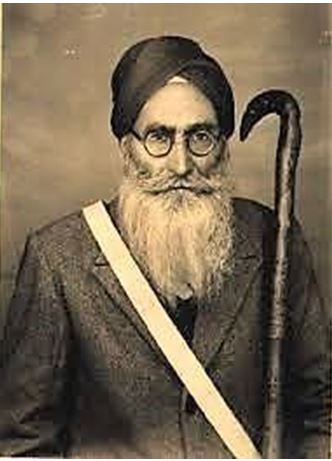KARTAR SINGH JHABBAR

Jathedar Kartar Singh Jhabbar (1874 – 20.11.1962), son of Bhai Teja Singh and grandson of Bhai Mangal Singh (a soldier of the army of Maharaja Ranjit Singh), was born at village Jhabbar (district Sheikhupura, Pakistan). When he grew up he joined Khalsa Updeshak Vidyala Gharjakh and studied Sikh literature for three years. In 1910, he moved to Lahore and carried out missionary work in the district. In 1912, he formed Khalsa Diwan Khara Sauda Bar and began missionary work. In 1913, he made major contribution for the establishment of a school at Chuharkana. After the massacre of Jallian Wala Bagh Amritsar (April 13, 1919), when the British government imposed martial law, he defied it by making political speeches. He was arrested and sent to Lahore jail. He was one of the 17 Sikhs who were given death sentence. Later, it was commuted to life imprisonment and he was sent to Andeman islands, to serve prison. He was released in 1920. When, on October 12, 1920, the so-called low caste Sikhs went to Darbar Sahib to make offerings, the priests refused to accept their offering of sacred food. Bhai Kartar Singh Jhabbar was one of the major Sikh leaders who were present there. The same day, when the priests of Akal Takht Sahib left Takht Sahib unattended, the Sikhs assumed the charge of Takht Sahib. Jathedar Kartar Singh Jhabbar addressed the Sikhs from Takht Sahib. On November 15, 1920, the S.G.P.C. was formed. He was selected as one of the first members of the S.G.P.C. On November 18, 1920, he led a Jatha to Punja Sahib and took control of the shrine. Here, the local Hindus tried to occupy the shrine. The Jatha of Jathedar Jhabbar saved the shrine with great difficulty. At this Jathedar Jhabbar suggested the formation of a Dal to support the actions of the S.G.P.C. (Later, this Dal, formed on December 14, 1920, was named Akali Dal and, in 1922, it was named the Shiromani Akali Dal). In February, he, along with Jathedar Lachhman Singh Dharowali, made a planning to take over Gurdwaras of Nanakana Sahib from the debauched manager of the shrines. Before Jathedar Jhabbar’s Jatha could reach Nanakana Sahib, the manager of the shrine had already killed Jathedar Lachhman Singh and more than 130 Sikhs. The Governor of Punjab reached Nanakana Sahib the following day. Jathedar Jhabbar compelled the Governor to immediately hand over the control of the shrines to the Sikhs. After some time Jathedar Jhabbar occupied other Gurdwaras of Nanakana Sahib also. On March 15, 1921, the Governor Punjab sent English army to Nanakana Sahib and arrested Jathedar Jhabbar, Jathedar Teja Singh Bhuchchar, Jathedar Tara Singh Tthetthar, Bhai Lakkha Singh etc. Later, Sir Jogindera Singh and Sunder Singh Majithia mediated and Jathedar Jhabbar was released. He was arrested again in 1924. He was released in December 1928. In 1933, he was arrested in connection with a murder case. He spent three months in jail. After 1937, he served the Akali Dal on low profile. Again, on June 21, 1955, he courted arrest during the Punjabi Suba Zindabad agitation. He died at village Habrhi (district Karnal) in 1962.
(Dr Harjinder Singh Dilgeer)